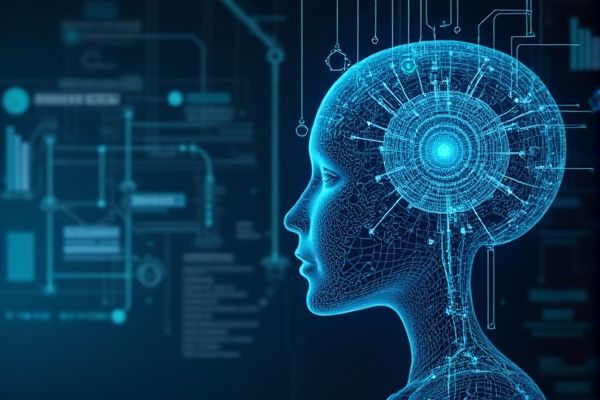
AI enhances recruitment processes by automating resume screening, allowing HR professionals to quickly identify qualified candidates based on predefined criteria. Predictive analytics tools assist in employee performance forecasting, enabling organizations to implement proactive talent management strategies. Chatbots provide instant support for employee inquiries, improving communication and streamlining administrative tasks. Personalized learning platforms use AI to tailor training programs, fostering employee development and enhancing overall workforce productivity.
AI usage in human resources management
Recruitment Automation
AI in human resources management can enhance recruitment automation by streamlining processes. For instance, AI-driven tools can analyze resumes quickly to identify suitable candidates, reducing manual effort. This technology can also predict candidate success based on historical data, improving hiring decisions. Organizations, like IBM, have employed such AI systems to gain an advantage in attracting top talent.
AI-Driven Talent Analytics
AI-driven talent analytics can significantly enhance the recruitment process by predicting candidate success based on historical data. For example, institutions like Google utilize machine learning algorithms to analyze resumes and assess potential employee performance. This technology can streamline hiring, reducing time and costs associated with traditional methods. Implementing such AI solutions may lead to a more diverse and skilled workforce, thus improving overall organizational efficiency.
Employee Retention Prediction
AI can enhance employee retention prediction by analyzing a range of data points, such as employee engagement surveys and turnover rates. For example, an institution like a university could deploy AI algorithms to identify patterns in staff satisfaction and factors leading to attrition. This predictive capability allows HR managers to implement targeted interventions that may improve retention rates. By leveraging data-driven insights, organizations can create a more supportive work environment, increasing the likelihood of employee satisfaction and longevity.
Bias Detection Algorithms
AI usage in human resources management offers the potential to enhance recruitment processes through Bias Detection Algorithms that identify and mitigate unfair hiring practices. These algorithms analyze language in job descriptions, ensuring they promote inclusivity and attract a diverse candidate pool. Companies like Google have begun implementing such technology, which can lead to more equitable hiring outcomes. The chance for organizations to improve their employee diversity and overall workplace culture increases with the adoption of these AI-driven solutions.
Personalized Learning & Development
AI can enhance human resources management by streamlining recruitment processes, such as using algorithms to match job candidates with positions at institutions like Google. In personalized learning and development, AI tools can analyze employee performance data to tailor training programs that meet individual needs and preferences. This technology suggests optimal learning paths, potentially increasing overall employee productivity and satisfaction. Implementing AI-driven strategies in HR can create a more effective workforce, with a higher chance of retaining top talent.
Workforce Planning Optimization
AI can enhance workforce planning optimization by analyzing employee data to predict staffing needs and improve resource allocation. Companies like IBM have successfully implemented AI tools to identify skills gaps and forecast hiring requirements. This technology increases the chances of matching the right talent to specific roles, enhancing productivity. The ability to make data-driven decisions can lead to a more agile and efficient human resources strategy.
Chatbot Employee Assistance
AI in human resources management can streamline various processes, such as recruitment and employee onboarding. Chatbot employee assistance offers a chance for companies like TechCorp to enhance employee engagement by providing instant responses to common queries. This technology can reduce HR workload significantly, allowing human resources teams to focus on strategic initiatives. The implementation of AI tools increases the likelihood of improved employee satisfaction and retention rates.
Performance Monitoring & Feedback
AI in human resources management can enhance performance monitoring and feedback processes. Utilizing machine learning algorithms allows for more accurate tracking of employee performance through various metrics, such as productivity levels and engagement scores. Tools like performance management software can provide data-driven insights, helping HR professionals identify top talent and areas for improvement. This technology can create a more efficient feedback loop, fostering a culture of continuous development within organizations, such as Global Tech Solutions.
Natural Language Processing for Resume Screening
AI can enhance human resource management by efficiently screening resumes using Natural Language Processing (NLP). This technology allows for the extraction and analysis of relevant skills and qualifications, improving the chances of identifying suitable candidates. Institutions like Deloitte have implemented such systems to streamline their hiring processes. Leveraging NLP not only saves time but also increases the likelihood of selecting the best talent available.
Sentiment Analysis for Employee Engagement
AI in human resources management can enhance the assessment of employee engagement through sentiment analysis of feedback and communication. This technology analyzes text data from surveys and internal messaging platforms to gauge employee sentiments and reactions. For instance, using tools like Natural Language Processing can provide insights into employee morale at a company like Google, where diverse feedback is essential. The possibility of identifying disengagement early allows HR teams to implement targeted interventions, potentially improving overall workforce satisfaction and productivity.
 techknowy.com
techknowy.com